Business Information Technology Systems: British Home Plc Case Study
VerifiedAdded on 2023/01/18
|11
|3969
|49
Report
AI Summary
This report analyzes the use of Information Technology (IT) within British Home Plc, a company that has not centralized its IT systems, resulting in potential profit loss. The report illustrates how IT can be used in various organizational functions such as data management, marketing, and process improvement. It discusses the contributions of IT in product development, process improvisation, cost efficiency, and gaining a competitive edge. Furthermore, the report evaluates different ways of dealing with information, including data storage, data processing, knowledge management, CRM (Operational, Analytical, Collaborative), and communication management. The evaluation of IT systems for supporting value-added change is also discussed, emphasizing the importance of appropriate IT utilization for data management, workload reduction, and regulatory compliance. The report concludes by highlighting how effective IT usage can lead to affordable services and higher profitability for British Home Plc.
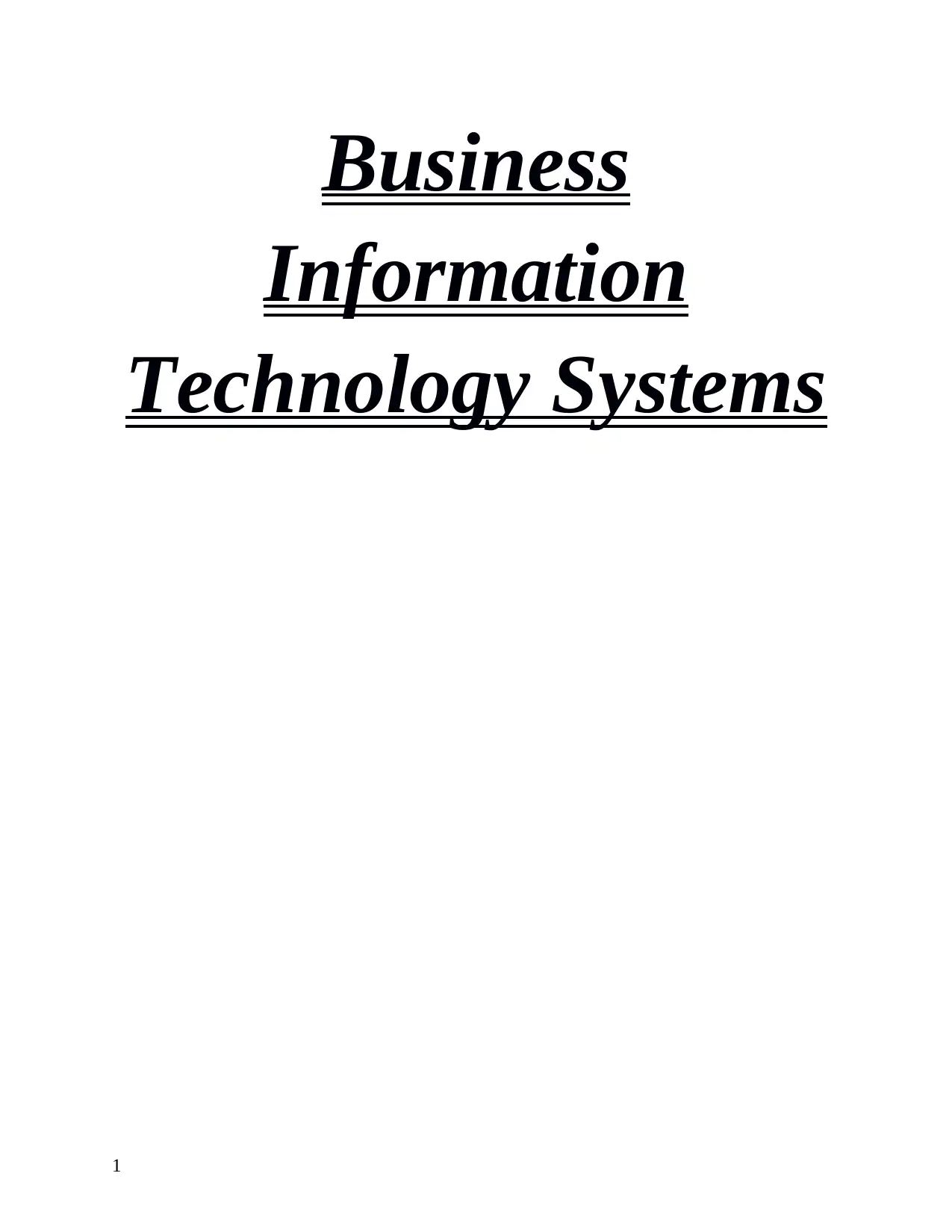
Business
Information
Technology Systems
1
Information
Technology Systems
1
Paraphrase This Document
Need a fresh take? Get an instant paraphrase of this document with our AI Paraphraser
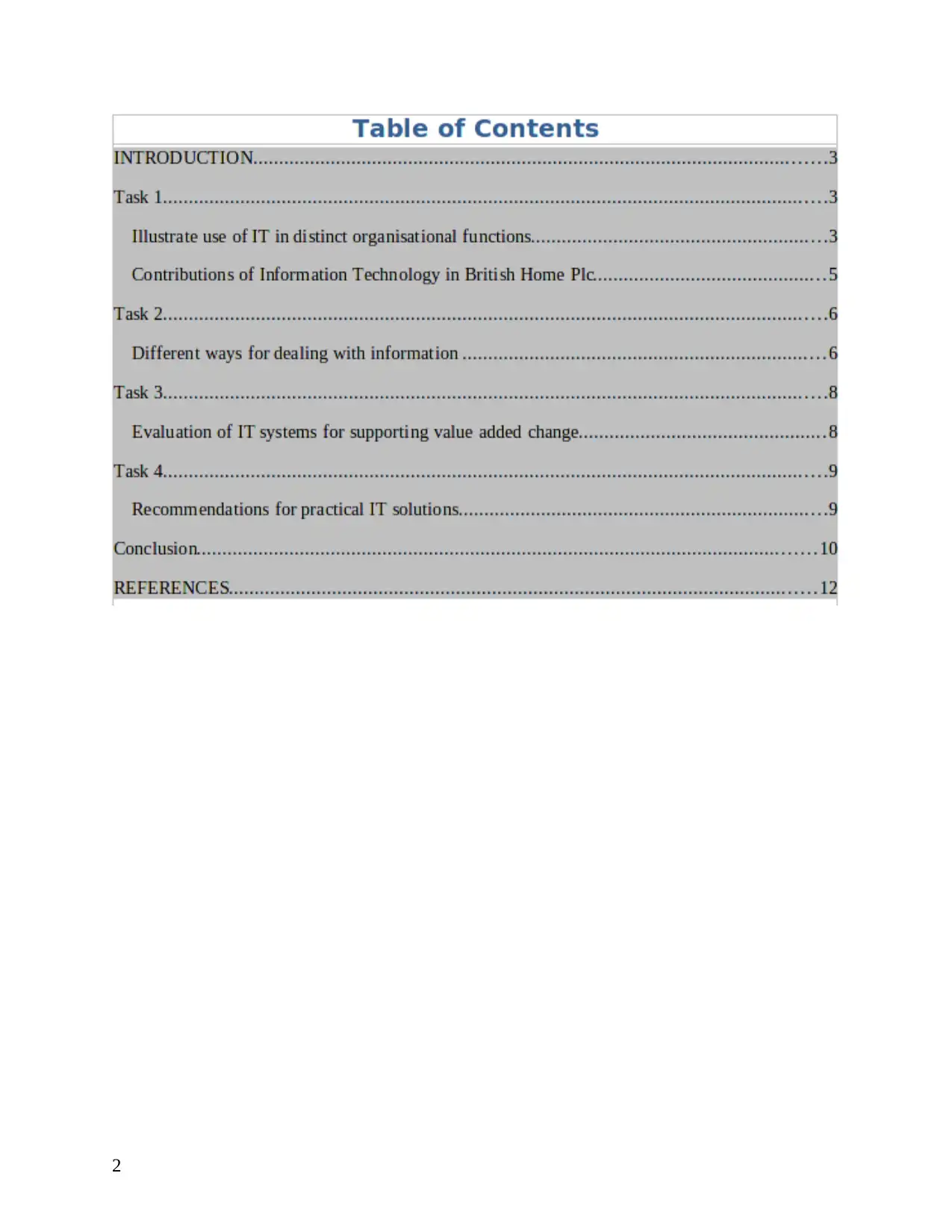
2
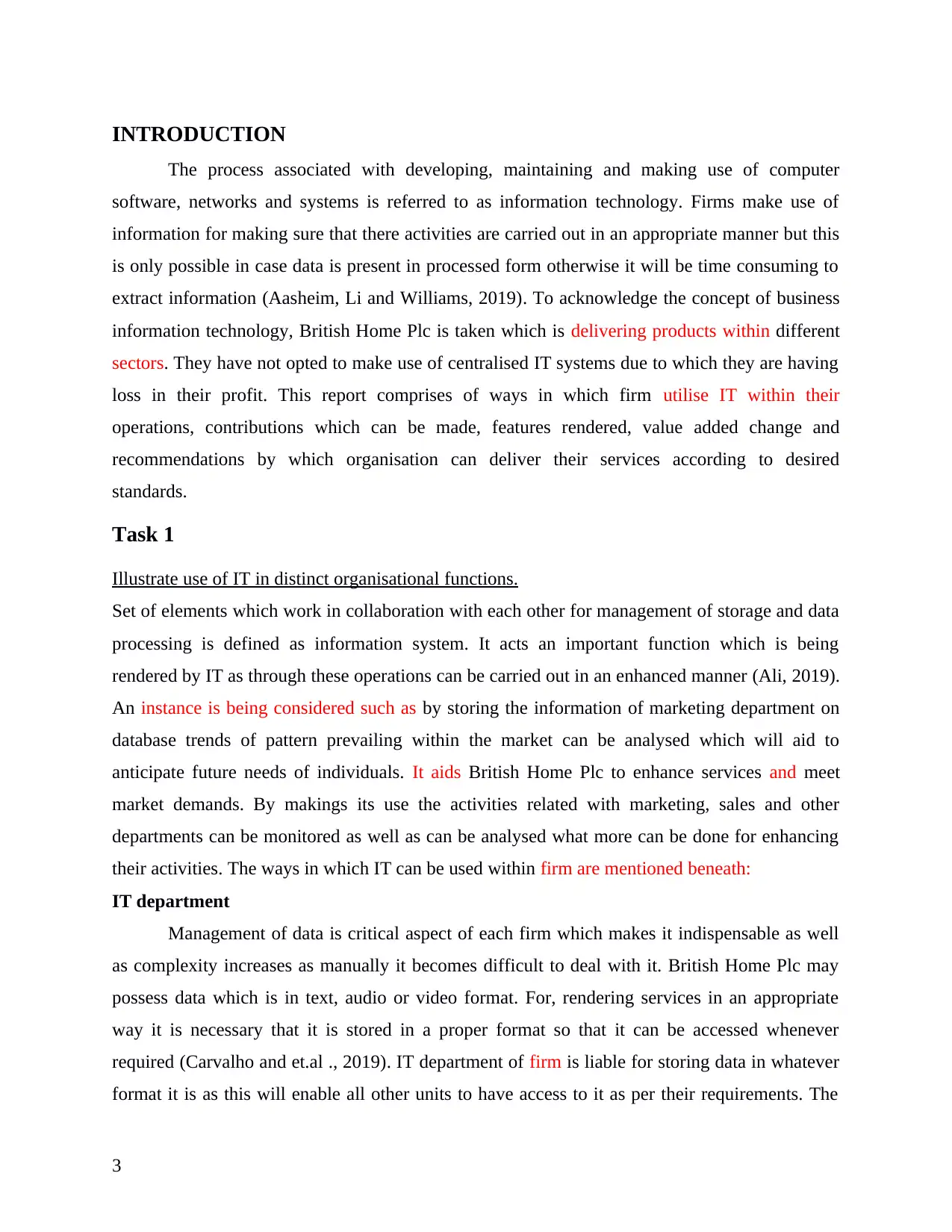
INTRODUCTION
The process associated with developing, maintaining and making use of computer
software, networks and systems is referred to as information technology. Firms make use of
information for making sure that there activities are carried out in an appropriate manner but this
is only possible in case data is present in processed form otherwise it will be time consuming to
extract information (Aasheim, Li and Williams, 2019). To acknowledge the concept of business
information technology, British Home Plc is taken which is delivering products within different
sectors. They have not opted to make use of centralised IT systems due to which they are having
loss in their profit. This report comprises of ways in which firm utilise IT within their
operations, contributions which can be made, features rendered, value added change and
recommendations by which organisation can deliver their services according to desired
standards.
Task 1
Illustrate use of IT in distinct organisational functions.
Set of elements which work in collaboration with each other for management of storage and data
processing is defined as information system. It acts an important function which is being
rendered by IT as through these operations can be carried out in an enhanced manner (Ali, 2019).
An instance is being considered such as by storing the information of marketing department on
database trends of pattern prevailing within the market can be analysed which will aid to
anticipate future needs of individuals. It aids British Home Plc to enhance services and meet
market demands. By makings its use the activities related with marketing, sales and other
departments can be monitored as well as can be analysed what more can be done for enhancing
their activities. The ways in which IT can be used within firm are mentioned beneath:
IT department
Management of data is critical aspect of each firm which makes it indispensable as well
as complexity increases as manually it becomes difficult to deal with it. British Home Plc may
possess data which is in text, audio or video format. For, rendering services in an appropriate
way it is necessary that it is stored in a proper format so that it can be accessed whenever
required (Carvalho and et.al ., 2019). IT department of firm is liable for storing data in whatever
format it is as this will enable all other units to have access to it as per their requirements. The
3
The process associated with developing, maintaining and making use of computer
software, networks and systems is referred to as information technology. Firms make use of
information for making sure that there activities are carried out in an appropriate manner but this
is only possible in case data is present in processed form otherwise it will be time consuming to
extract information (Aasheim, Li and Williams, 2019). To acknowledge the concept of business
information technology, British Home Plc is taken which is delivering products within different
sectors. They have not opted to make use of centralised IT systems due to which they are having
loss in their profit. This report comprises of ways in which firm utilise IT within their
operations, contributions which can be made, features rendered, value added change and
recommendations by which organisation can deliver their services according to desired
standards.
Task 1
Illustrate use of IT in distinct organisational functions.
Set of elements which work in collaboration with each other for management of storage and data
processing is defined as information system. It acts an important function which is being
rendered by IT as through these operations can be carried out in an enhanced manner (Ali, 2019).
An instance is being considered such as by storing the information of marketing department on
database trends of pattern prevailing within the market can be analysed which will aid to
anticipate future needs of individuals. It aids British Home Plc to enhance services and meet
market demands. By makings its use the activities related with marketing, sales and other
departments can be monitored as well as can be analysed what more can be done for enhancing
their activities. The ways in which IT can be used within firm are mentioned beneath:
IT department
Management of data is critical aspect of each firm which makes it indispensable as well
as complexity increases as manually it becomes difficult to deal with it. British Home Plc may
possess data which is in text, audio or video format. For, rendering services in an appropriate
way it is necessary that it is stored in a proper format so that it can be accessed whenever
required (Carvalho and et.al ., 2019). IT department of firm is liable for storing data in whatever
format it is as this will enable all other units to have access to it as per their requirements. The
3
⊘ This is a preview!⊘
Do you want full access?
Subscribe today to unlock all pages.

Trusted by 1+ million students worldwide
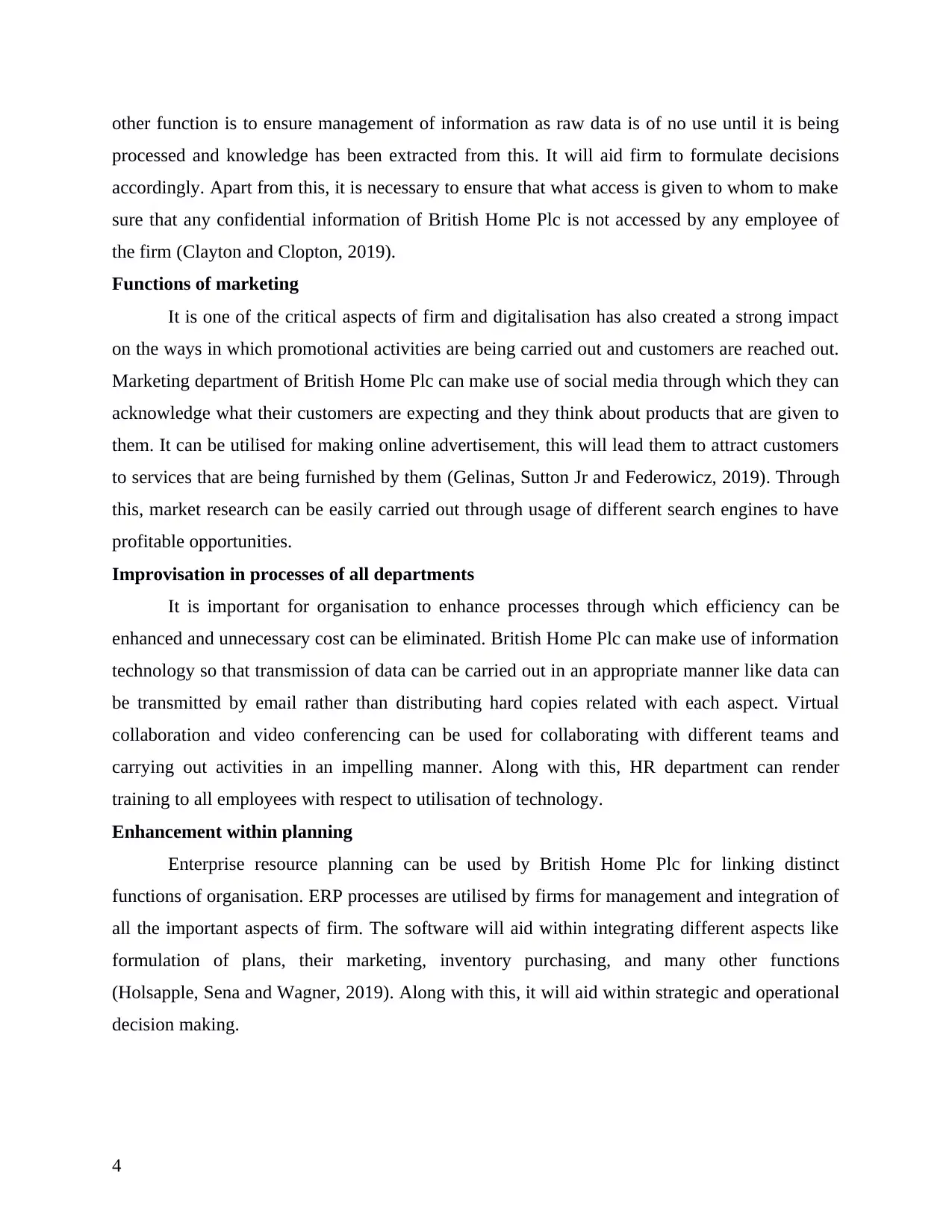
other function is to ensure management of information as raw data is of no use until it is being
processed and knowledge has been extracted from this. It will aid firm to formulate decisions
accordingly. Apart from this, it is necessary to ensure that what access is given to whom to make
sure that any confidential information of British Home Plc is not accessed by any employee of
the firm (Clayton and Clopton, 2019).
Functions of marketing
It is one of the critical aspects of firm and digitalisation has also created a strong impact
on the ways in which promotional activities are being carried out and customers are reached out.
Marketing department of British Home Plc can make use of social media through which they can
acknowledge what their customers are expecting and they think about products that are given to
them. It can be utilised for making online advertisement, this will lead them to attract customers
to services that are being furnished by them (Gelinas, Sutton Jr and Federowicz, 2019). Through
this, market research can be easily carried out through usage of different search engines to have
profitable opportunities.
Improvisation in processes of all departments
It is important for organisation to enhance processes through which efficiency can be
enhanced and unnecessary cost can be eliminated. British Home Plc can make use of information
technology so that transmission of data can be carried out in an appropriate manner like data can
be transmitted by email rather than distributing hard copies related with each aspect. Virtual
collaboration and video conferencing can be used for collaborating with different teams and
carrying out activities in an impelling manner. Along with this, HR department can render
training to all employees with respect to utilisation of technology.
Enhancement within planning
Enterprise resource planning can be used by British Home Plc for linking distinct
functions of organisation. ERP processes are utilised by firms for management and integration of
all the important aspects of firm. The software will aid within integrating different aspects like
formulation of plans, their marketing, inventory purchasing, and many other functions
(Holsapple, Sena and Wagner, 2019). Along with this, it will aid within strategic and operational
decision making.
4
processed and knowledge has been extracted from this. It will aid firm to formulate decisions
accordingly. Apart from this, it is necessary to ensure that what access is given to whom to make
sure that any confidential information of British Home Plc is not accessed by any employee of
the firm (Clayton and Clopton, 2019).
Functions of marketing
It is one of the critical aspects of firm and digitalisation has also created a strong impact
on the ways in which promotional activities are being carried out and customers are reached out.
Marketing department of British Home Plc can make use of social media through which they can
acknowledge what their customers are expecting and they think about products that are given to
them. It can be utilised for making online advertisement, this will lead them to attract customers
to services that are being furnished by them (Gelinas, Sutton Jr and Federowicz, 2019). Through
this, market research can be easily carried out through usage of different search engines to have
profitable opportunities.
Improvisation in processes of all departments
It is important for organisation to enhance processes through which efficiency can be
enhanced and unnecessary cost can be eliminated. British Home Plc can make use of information
technology so that transmission of data can be carried out in an appropriate manner like data can
be transmitted by email rather than distributing hard copies related with each aspect. Virtual
collaboration and video conferencing can be used for collaborating with different teams and
carrying out activities in an impelling manner. Along with this, HR department can render
training to all employees with respect to utilisation of technology.
Enhancement within planning
Enterprise resource planning can be used by British Home Plc for linking distinct
functions of organisation. ERP processes are utilised by firms for management and integration of
all the important aspects of firm. The software will aid within integrating different aspects like
formulation of plans, their marketing, inventory purchasing, and many other functions
(Holsapple, Sena and Wagner, 2019). Along with this, it will aid within strategic and operational
decision making.
4
Paraphrase This Document
Need a fresh take? Get an instant paraphrase of this document with our AI Paraphraser
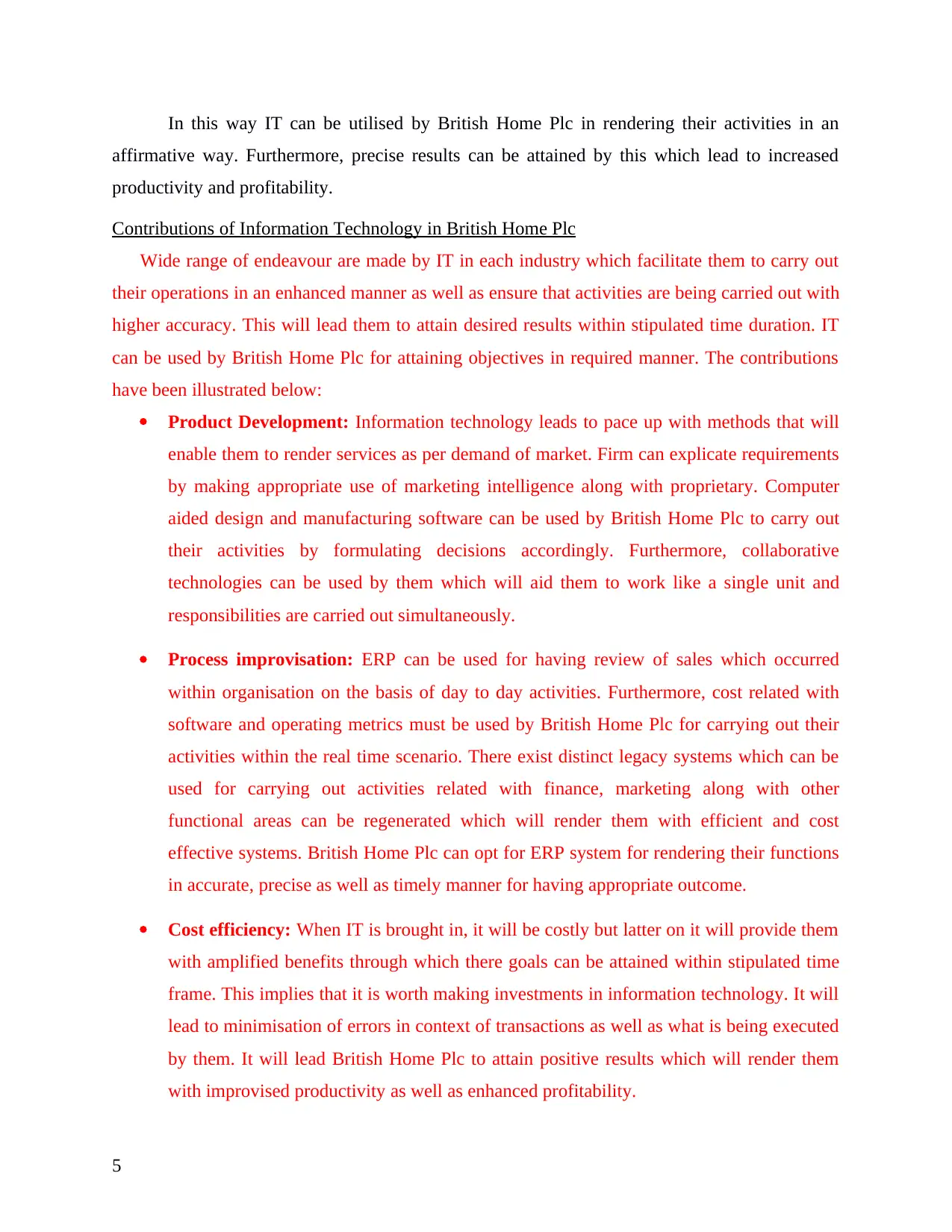
In this way IT can be utilised by British Home Plc in rendering their activities in an
affirmative way. Furthermore, precise results can be attained by this which lead to increased
productivity and profitability.
Contributions of Information Technology in British Home Plc
Wide range of endeavour are made by IT in each industry which facilitate them to carry out
their operations in an enhanced manner as well as ensure that activities are being carried out with
higher accuracy. This will lead them to attain desired results within stipulated time duration. IT
can be used by British Home Plc for attaining objectives in required manner. The contributions
have been illustrated below:
Product Development: Information technology leads to pace up with methods that will
enable them to render services as per demand of market. Firm can explicate requirements
by making appropriate use of marketing intelligence along with proprietary. Computer
aided design and manufacturing software can be used by British Home Plc to carry out
their activities by formulating decisions accordingly. Furthermore, collaborative
technologies can be used by them which will aid them to work like a single unit and
responsibilities are carried out simultaneously.
Process improvisation: ERP can be used for having review of sales which occurred
within organisation on the basis of day to day activities. Furthermore, cost related with
software and operating metrics must be used by British Home Plc for carrying out their
activities within the real time scenario. There exist distinct legacy systems which can be
used for carrying out activities related with finance, marketing along with other
functional areas can be regenerated which will render them with efficient and cost
effective systems. British Home Plc can opt for ERP system for rendering their functions
in accurate, precise as well as timely manner for having appropriate outcome.
Cost efficiency: When IT is brought in, it will be costly but latter on it will provide them
with amplified benefits through which there goals can be attained within stipulated time
frame. This implies that it is worth making investments in information technology. It will
lead to minimisation of errors in context of transactions as well as what is being executed
by them. It will lead British Home Plc to attain positive results which will render them
with improvised productivity as well as enhanced profitability.
5
affirmative way. Furthermore, precise results can be attained by this which lead to increased
productivity and profitability.
Contributions of Information Technology in British Home Plc
Wide range of endeavour are made by IT in each industry which facilitate them to carry out
their operations in an enhanced manner as well as ensure that activities are being carried out with
higher accuracy. This will lead them to attain desired results within stipulated time duration. IT
can be used by British Home Plc for attaining objectives in required manner. The contributions
have been illustrated below:
Product Development: Information technology leads to pace up with methods that will
enable them to render services as per demand of market. Firm can explicate requirements
by making appropriate use of marketing intelligence along with proprietary. Computer
aided design and manufacturing software can be used by British Home Plc to carry out
their activities by formulating decisions accordingly. Furthermore, collaborative
technologies can be used by them which will aid them to work like a single unit and
responsibilities are carried out simultaneously.
Process improvisation: ERP can be used for having review of sales which occurred
within organisation on the basis of day to day activities. Furthermore, cost related with
software and operating metrics must be used by British Home Plc for carrying out their
activities within the real time scenario. There exist distinct legacy systems which can be
used for carrying out activities related with finance, marketing along with other
functional areas can be regenerated which will render them with efficient and cost
effective systems. British Home Plc can opt for ERP system for rendering their functions
in accurate, precise as well as timely manner for having appropriate outcome.
Cost efficiency: When IT is brought in, it will be costly but latter on it will provide them
with amplified benefits through which there goals can be attained within stipulated time
frame. This implies that it is worth making investments in information technology. It will
lead to minimisation of errors in context of transactions as well as what is being executed
by them. It will lead British Home Plc to attain positive results which will render them
with improvised productivity as well as enhanced profitability.
5
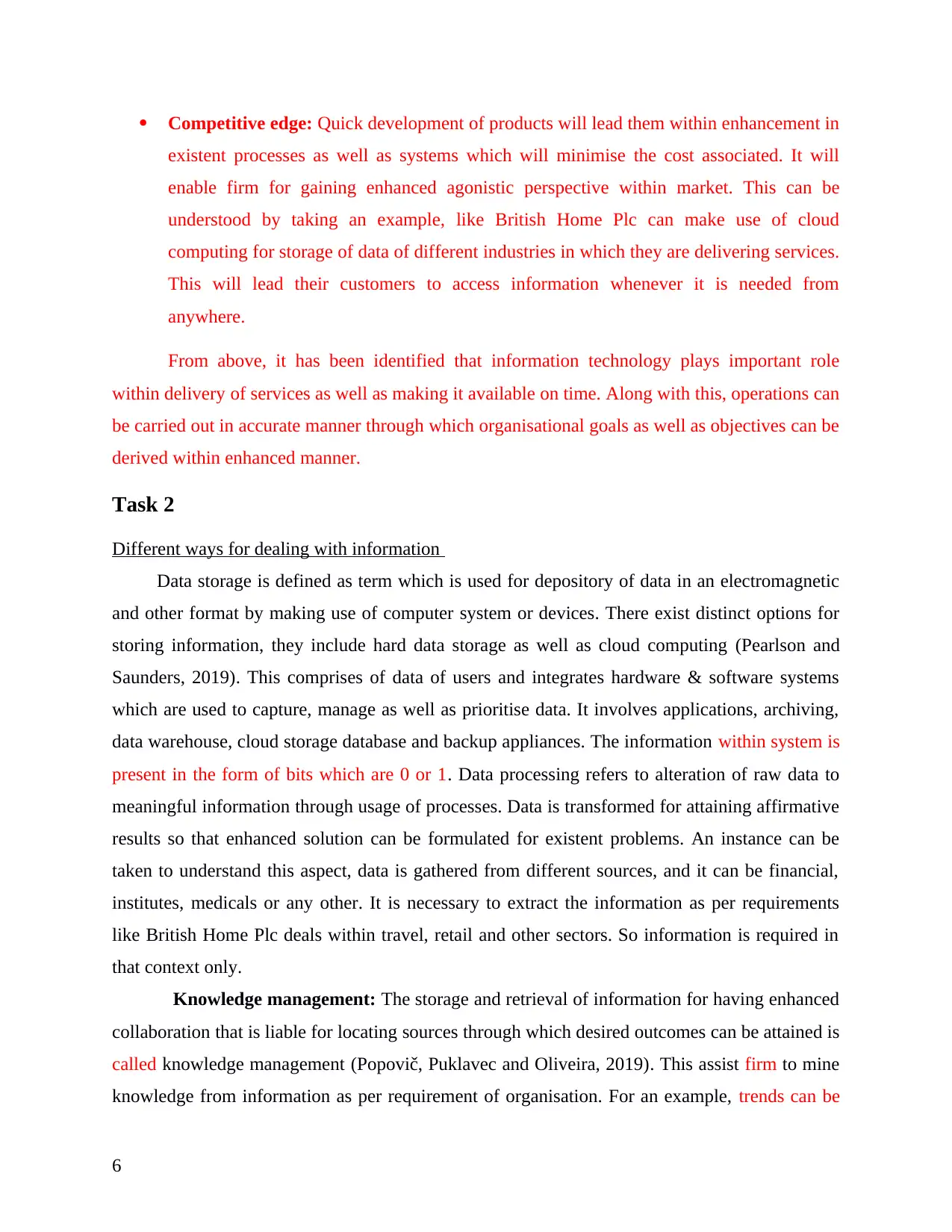
Competitive edge: Quick development of products will lead them within enhancement in
existent processes as well as systems which will minimise the cost associated. It will
enable firm for gaining enhanced agonistic perspective within market. This can be
understood by taking an example, like British Home Plc can make use of cloud
computing for storage of data of different industries in which they are delivering services.
This will lead their customers to access information whenever it is needed from
anywhere.
From above, it has been identified that information technology plays important role
within delivery of services as well as making it available on time. Along with this, operations can
be carried out in accurate manner through which organisational goals as well as objectives can be
derived within enhanced manner.
Task 2
Different ways for dealing with information
Data storage is defined as term which is used for depository of data in an electromagnetic
and other format by making use of computer system or devices. There exist distinct options for
storing information, they include hard data storage as well as cloud computing (Pearlson and
Saunders, 2019). This comprises of data of users and integrates hardware & software systems
which are used to capture, manage as well as prioritise data. It involves applications, archiving,
data warehouse, cloud storage database and backup appliances. The information within system is
present in the form of bits which are 0 or 1. Data processing refers to alteration of raw data to
meaningful information through usage of processes. Data is transformed for attaining affirmative
results so that enhanced solution can be formulated for existent problems. An instance can be
taken to understand this aspect, data is gathered from different sources, and it can be financial,
institutes, medicals or any other. It is necessary to extract the information as per requirements
like British Home Plc deals within travel, retail and other sectors. So information is required in
that context only.
Knowledge management: The storage and retrieval of information for having enhanced
collaboration that is liable for locating sources through which desired outcomes can be attained is
called knowledge management (Popovič, Puklavec and Oliveira, 2019). This assist firm to mine
knowledge from information as per requirement of organisation. For an example, trends can be
6
existent processes as well as systems which will minimise the cost associated. It will
enable firm for gaining enhanced agonistic perspective within market. This can be
understood by taking an example, like British Home Plc can make use of cloud
computing for storage of data of different industries in which they are delivering services.
This will lead their customers to access information whenever it is needed from
anywhere.
From above, it has been identified that information technology plays important role
within delivery of services as well as making it available on time. Along with this, operations can
be carried out in accurate manner through which organisational goals as well as objectives can be
derived within enhanced manner.
Task 2
Different ways for dealing with information
Data storage is defined as term which is used for depository of data in an electromagnetic
and other format by making use of computer system or devices. There exist distinct options for
storing information, they include hard data storage as well as cloud computing (Pearlson and
Saunders, 2019). This comprises of data of users and integrates hardware & software systems
which are used to capture, manage as well as prioritise data. It involves applications, archiving,
data warehouse, cloud storage database and backup appliances. The information within system is
present in the form of bits which are 0 or 1. Data processing refers to alteration of raw data to
meaningful information through usage of processes. Data is transformed for attaining affirmative
results so that enhanced solution can be formulated for existent problems. An instance can be
taken to understand this aspect, data is gathered from different sources, and it can be financial,
institutes, medicals or any other. It is necessary to extract the information as per requirements
like British Home Plc deals within travel, retail and other sectors. So information is required in
that context only.
Knowledge management: The storage and retrieval of information for having enhanced
collaboration that is liable for locating sources through which desired outcomes can be attained is
called knowledge management (Popovič, Puklavec and Oliveira, 2019). This assist firm to mine
knowledge from information as per requirement of organisation. For an example, trends can be
6
⊘ This is a preview!⊘
Do you want full access?
Subscribe today to unlock all pages.

Trusted by 1+ million students worldwide
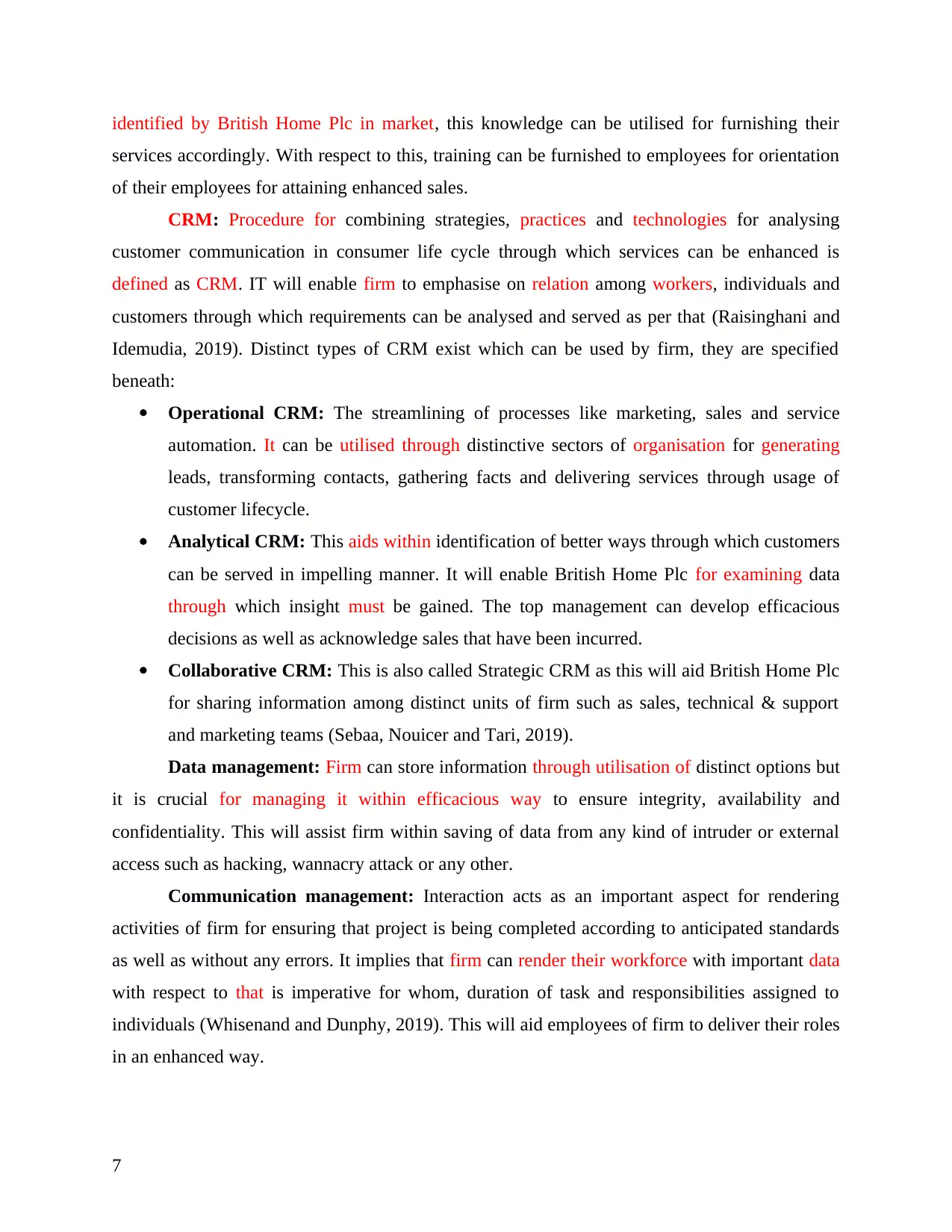
identified by British Home Plc in market, this knowledge can be utilised for furnishing their
services accordingly. With respect to this, training can be furnished to employees for orientation
of their employees for attaining enhanced sales.
CRM: Procedure for combining strategies, practices and technologies for analysing
customer communication in consumer life cycle through which services can be enhanced is
defined as CRM. IT will enable firm to emphasise on relation among workers, individuals and
customers through which requirements can be analysed and served as per that (Raisinghani and
Idemudia, 2019). Distinct types of CRM exist which can be used by firm, they are specified
beneath:
Operational CRM: The streamlining of processes like marketing, sales and service
automation. It can be utilised through distinctive sectors of organisation for generating
leads, transforming contacts, gathering facts and delivering services through usage of
customer lifecycle.
Analytical CRM: This aids within identification of better ways through which customers
can be served in impelling manner. It will enable British Home Plc for examining data
through which insight must be gained. The top management can develop efficacious
decisions as well as acknowledge sales that have been incurred.
Collaborative CRM: This is also called Strategic CRM as this will aid British Home Plc
for sharing information among distinct units of firm such as sales, technical & support
and marketing teams (Sebaa, Nouicer and Tari, 2019).
Data management: Firm can store information through utilisation of distinct options but
it is crucial for managing it within efficacious way to ensure integrity, availability and
confidentiality. This will assist firm within saving of data from any kind of intruder or external
access such as hacking, wannacry attack or any other.
Communication management: Interaction acts as an important aspect for rendering
activities of firm for ensuring that project is being completed according to anticipated standards
as well as without any errors. It implies that firm can render their workforce with important data
with respect to that is imperative for whom, duration of task and responsibilities assigned to
individuals (Whisenand and Dunphy, 2019). This will aid employees of firm to deliver their roles
in an enhanced way.
7
services accordingly. With respect to this, training can be furnished to employees for orientation
of their employees for attaining enhanced sales.
CRM: Procedure for combining strategies, practices and technologies for analysing
customer communication in consumer life cycle through which services can be enhanced is
defined as CRM. IT will enable firm to emphasise on relation among workers, individuals and
customers through which requirements can be analysed and served as per that (Raisinghani and
Idemudia, 2019). Distinct types of CRM exist which can be used by firm, they are specified
beneath:
Operational CRM: The streamlining of processes like marketing, sales and service
automation. It can be utilised through distinctive sectors of organisation for generating
leads, transforming contacts, gathering facts and delivering services through usage of
customer lifecycle.
Analytical CRM: This aids within identification of better ways through which customers
can be served in impelling manner. It will enable British Home Plc for examining data
through which insight must be gained. The top management can develop efficacious
decisions as well as acknowledge sales that have been incurred.
Collaborative CRM: This is also called Strategic CRM as this will aid British Home Plc
for sharing information among distinct units of firm such as sales, technical & support
and marketing teams (Sebaa, Nouicer and Tari, 2019).
Data management: Firm can store information through utilisation of distinct options but
it is crucial for managing it within efficacious way to ensure integrity, availability and
confidentiality. This will assist firm within saving of data from any kind of intruder or external
access such as hacking, wannacry attack or any other.
Communication management: Interaction acts as an important aspect for rendering
activities of firm for ensuring that project is being completed according to anticipated standards
as well as without any errors. It implies that firm can render their workforce with important data
with respect to that is imperative for whom, duration of task and responsibilities assigned to
individuals (Whisenand and Dunphy, 2019). This will aid employees of firm to deliver their roles
in an enhanced way.
7
Paraphrase This Document
Need a fresh take? Get an instant paraphrase of this document with our AI Paraphraser
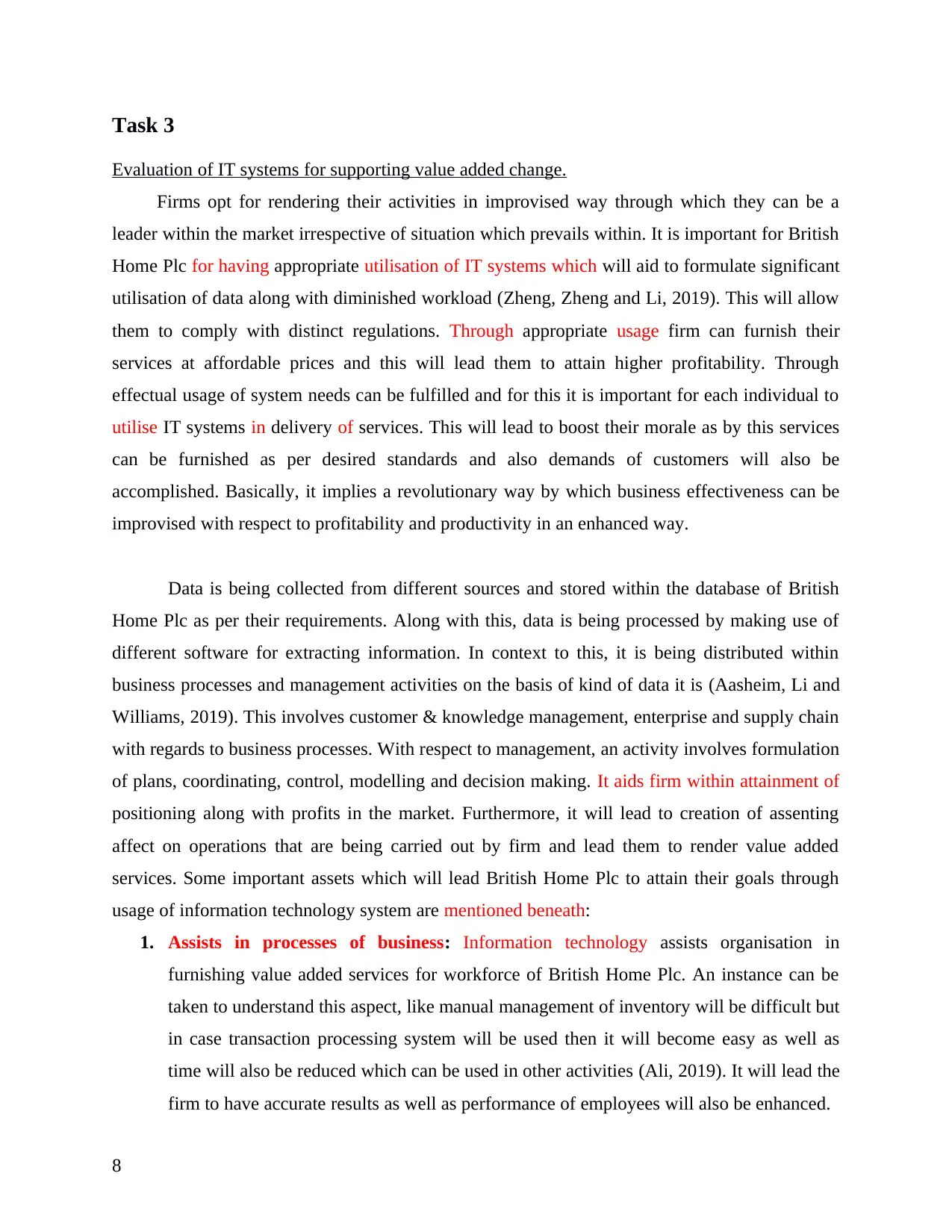
Task 3
Evaluation of IT systems for supporting value added change.
Firms opt for rendering their activities in improvised way through which they can be a
leader within the market irrespective of situation which prevails within. It is important for British
Home Plc for having appropriate utilisation of IT systems which will aid to formulate significant
utilisation of data along with diminished workload (Zheng, Zheng and Li, 2019). This will allow
them to comply with distinct regulations. Through appropriate usage firm can furnish their
services at affordable prices and this will lead them to attain higher profitability. Through
effectual usage of system needs can be fulfilled and for this it is important for each individual to
utilise IT systems in delivery of services. This will lead to boost their morale as by this services
can be furnished as per desired standards and also demands of customers will also be
accomplished. Basically, it implies a revolutionary way by which business effectiveness can be
improvised with respect to profitability and productivity in an enhanced way.
Data is being collected from different sources and stored within the database of British
Home Plc as per their requirements. Along with this, data is being processed by making use of
different software for extracting information. In context to this, it is being distributed within
business processes and management activities on the basis of kind of data it is (Aasheim, Li and
Williams, 2019). This involves customer & knowledge management, enterprise and supply chain
with regards to business processes. With respect to management, an activity involves formulation
of plans, coordinating, control, modelling and decision making. It aids firm within attainment of
positioning along with profits in the market. Furthermore, it will lead to creation of assenting
affect on operations that are being carried out by firm and lead them to render value added
services. Some important assets which will lead British Home Plc to attain their goals through
usage of information technology system are mentioned beneath:
1. Assists in processes of business: Information technology assists organisation in
furnishing value added services for workforce of British Home Plc. An instance can be
taken to understand this aspect, like manual management of inventory will be difficult but
in case transaction processing system will be used then it will become easy as well as
time will also be reduced which can be used in other activities (Ali, 2019). It will lead the
firm to have accurate results as well as performance of employees will also be enhanced.
8
Evaluation of IT systems for supporting value added change.
Firms opt for rendering their activities in improvised way through which they can be a
leader within the market irrespective of situation which prevails within. It is important for British
Home Plc for having appropriate utilisation of IT systems which will aid to formulate significant
utilisation of data along with diminished workload (Zheng, Zheng and Li, 2019). This will allow
them to comply with distinct regulations. Through appropriate usage firm can furnish their
services at affordable prices and this will lead them to attain higher profitability. Through
effectual usage of system needs can be fulfilled and for this it is important for each individual to
utilise IT systems in delivery of services. This will lead to boost their morale as by this services
can be furnished as per desired standards and also demands of customers will also be
accomplished. Basically, it implies a revolutionary way by which business effectiveness can be
improvised with respect to profitability and productivity in an enhanced way.
Data is being collected from different sources and stored within the database of British
Home Plc as per their requirements. Along with this, data is being processed by making use of
different software for extracting information. In context to this, it is being distributed within
business processes and management activities on the basis of kind of data it is (Aasheim, Li and
Williams, 2019). This involves customer & knowledge management, enterprise and supply chain
with regards to business processes. With respect to management, an activity involves formulation
of plans, coordinating, control, modelling and decision making. It aids firm within attainment of
positioning along with profits in the market. Furthermore, it will lead to creation of assenting
affect on operations that are being carried out by firm and lead them to render value added
services. Some important assets which will lead British Home Plc to attain their goals through
usage of information technology system are mentioned beneath:
1. Assists in processes of business: Information technology assists organisation in
furnishing value added services for workforce of British Home Plc. An instance can be
taken to understand this aspect, like manual management of inventory will be difficult but
in case transaction processing system will be used then it will become easy as well as
time will also be reduced which can be used in other activities (Ali, 2019). It will lead the
firm to have accurate results as well as performance of employees will also be enhanced.
8
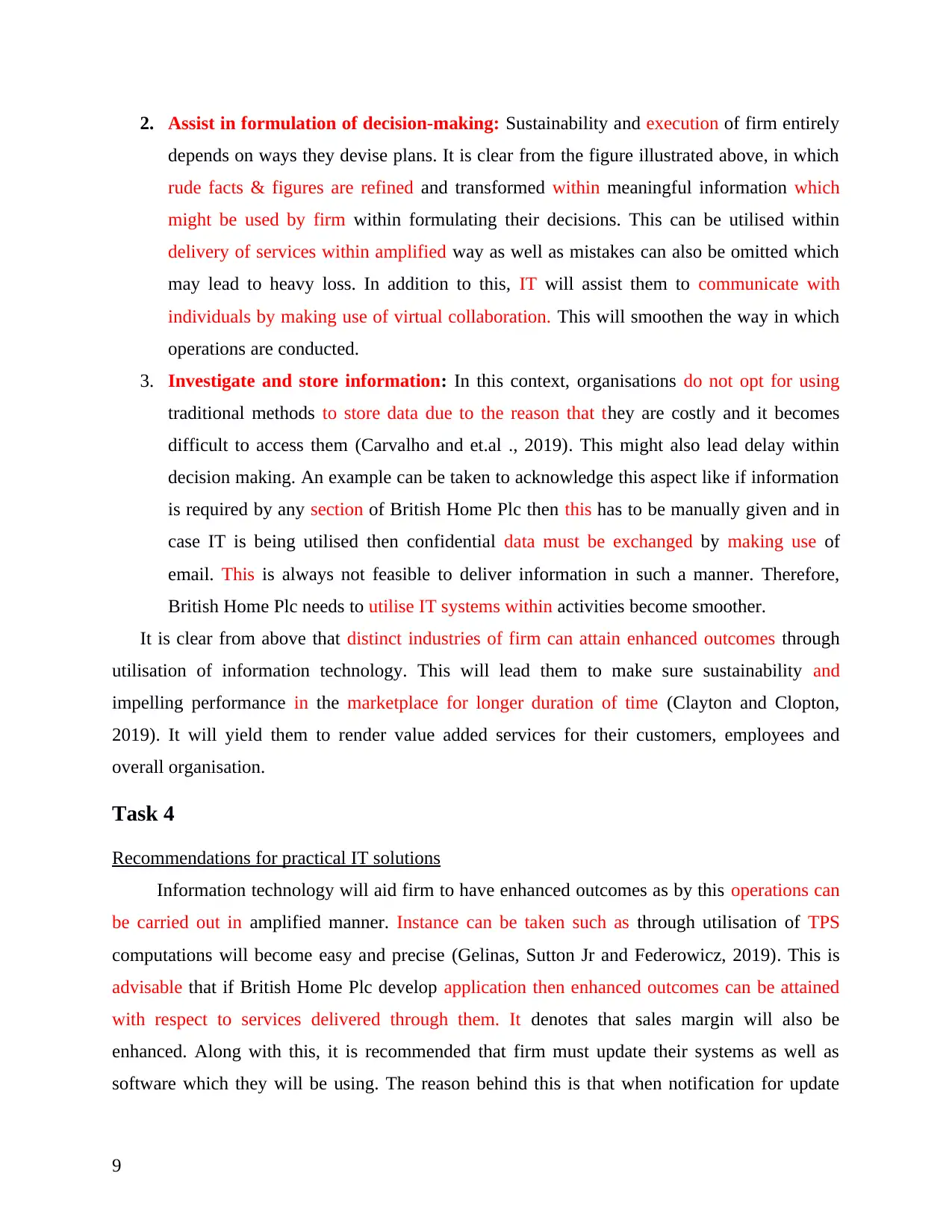
2. Assist in formulation of decision-making: Sustainability and execution of firm entirely
depends on ways they devise plans. It is clear from the figure illustrated above, in which
rude facts & figures are refined and transformed within meaningful information which
might be used by firm within formulating their decisions. This can be utilised within
delivery of services within amplified way as well as mistakes can also be omitted which
may lead to heavy loss. In addition to this, IT will assist them to communicate with
individuals by making use of virtual collaboration. This will smoothen the way in which
operations are conducted.
3. Investigate and store information: In this context, organisations do not opt for using
traditional methods to store data due to the reason that they are costly and it becomes
difficult to access them (Carvalho and et.al ., 2019). This might also lead delay within
decision making. An example can be taken to acknowledge this aspect like if information
is required by any section of British Home Plc then this has to be manually given and in
case IT is being utilised then confidential data must be exchanged by making use of
email. This is always not feasible to deliver information in such a manner. Therefore,
British Home Plc needs to utilise IT systems within activities become smoother.
It is clear from above that distinct industries of firm can attain enhanced outcomes through
utilisation of information technology. This will lead them to make sure sustainability and
impelling performance in the marketplace for longer duration of time (Clayton and Clopton,
2019). It will yield them to render value added services for their customers, employees and
overall organisation.
Task 4
Recommendations for practical IT solutions
Information technology will aid firm to have enhanced outcomes as by this operations can
be carried out in amplified manner. Instance can be taken such as through utilisation of TPS
computations will become easy and precise (Gelinas, Sutton Jr and Federowicz, 2019). This is
advisable that if British Home Plc develop application then enhanced outcomes can be attained
with respect to services delivered through them. It denotes that sales margin will also be
enhanced. Along with this, it is recommended that firm must update their systems as well as
software which they will be using. The reason behind this is that when notification for update
9
depends on ways they devise plans. It is clear from the figure illustrated above, in which
rude facts & figures are refined and transformed within meaningful information which
might be used by firm within formulating their decisions. This can be utilised within
delivery of services within amplified way as well as mistakes can also be omitted which
may lead to heavy loss. In addition to this, IT will assist them to communicate with
individuals by making use of virtual collaboration. This will smoothen the way in which
operations are conducted.
3. Investigate and store information: In this context, organisations do not opt for using
traditional methods to store data due to the reason that they are costly and it becomes
difficult to access them (Carvalho and et.al ., 2019). This might also lead delay within
decision making. An example can be taken to acknowledge this aspect like if information
is required by any section of British Home Plc then this has to be manually given and in
case IT is being utilised then confidential data must be exchanged by making use of
email. This is always not feasible to deliver information in such a manner. Therefore,
British Home Plc needs to utilise IT systems within activities become smoother.
It is clear from above that distinct industries of firm can attain enhanced outcomes through
utilisation of information technology. This will lead them to make sure sustainability and
impelling performance in the marketplace for longer duration of time (Clayton and Clopton,
2019). It will yield them to render value added services for their customers, employees and
overall organisation.
Task 4
Recommendations for practical IT solutions
Information technology will aid firm to have enhanced outcomes as by this operations can
be carried out in amplified manner. Instance can be taken such as through utilisation of TPS
computations will become easy and precise (Gelinas, Sutton Jr and Federowicz, 2019). This is
advisable that if British Home Plc develop application then enhanced outcomes can be attained
with respect to services delivered through them. It denotes that sales margin will also be
enhanced. Along with this, it is recommended that firm must update their systems as well as
software which they will be using. The reason behind this is that when notification for update
9
⊘ This is a preview!⊘
Do you want full access?
Subscribe today to unlock all pages.

Trusted by 1+ million students worldwide
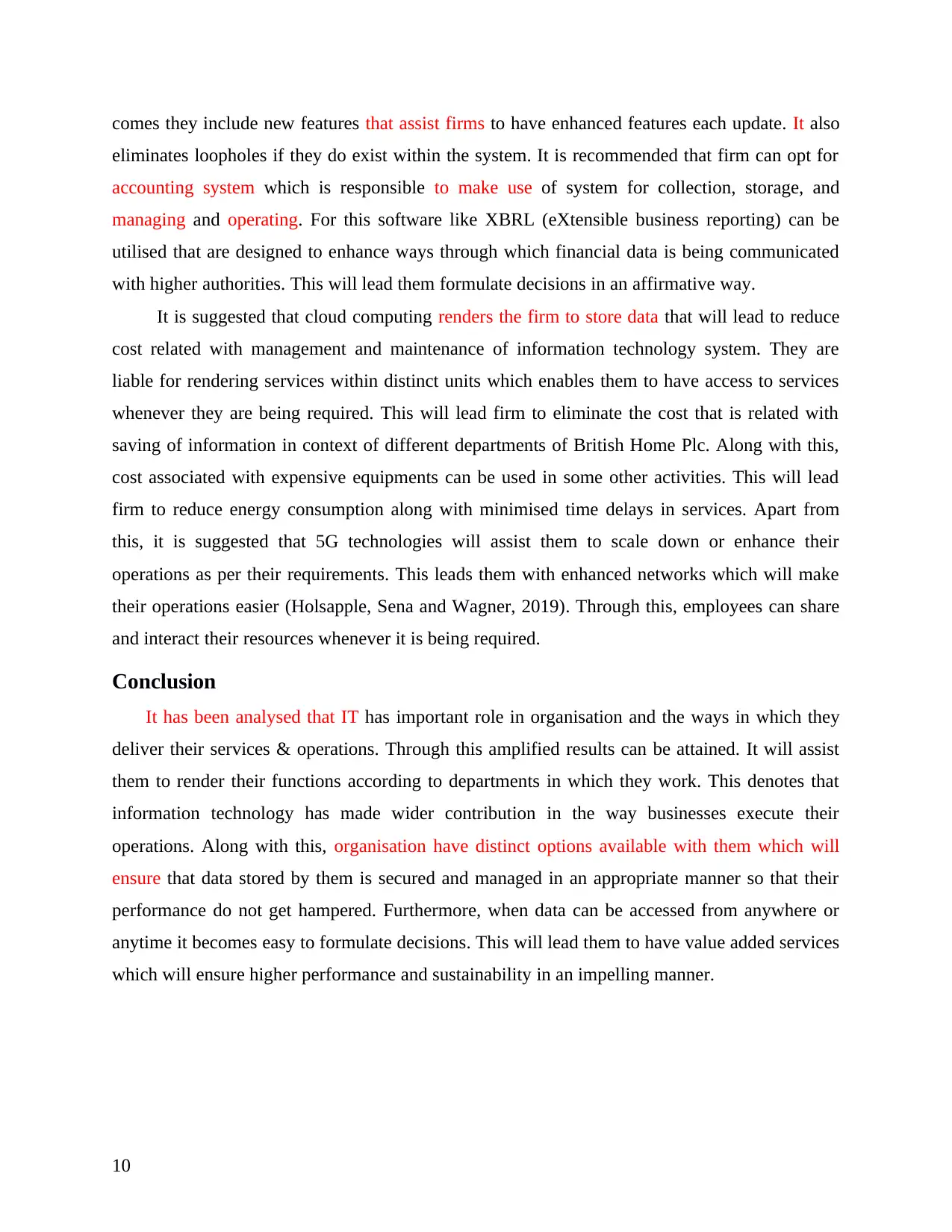
comes they include new features that assist firms to have enhanced features each update. It also
eliminates loopholes if they do exist within the system. It is recommended that firm can opt for
accounting system which is responsible to make use of system for collection, storage, and
managing and operating. For this software like XBRL (eXtensible business reporting) can be
utilised that are designed to enhance ways through which financial data is being communicated
with higher authorities. This will lead them formulate decisions in an affirmative way.
It is suggested that cloud computing renders the firm to store data that will lead to reduce
cost related with management and maintenance of information technology system. They are
liable for rendering services within distinct units which enables them to have access to services
whenever they are being required. This will lead firm to eliminate the cost that is related with
saving of information in context of different departments of British Home Plc. Along with this,
cost associated with expensive equipments can be used in some other activities. This will lead
firm to reduce energy consumption along with minimised time delays in services. Apart from
this, it is suggested that 5G technologies will assist them to scale down or enhance their
operations as per their requirements. This leads them with enhanced networks which will make
their operations easier (Holsapple, Sena and Wagner, 2019). Through this, employees can share
and interact their resources whenever it is being required.
Conclusion
It has been analysed that IT has important role in organisation and the ways in which they
deliver their services & operations. Through this amplified results can be attained. It will assist
them to render their functions according to departments in which they work. This denotes that
information technology has made wider contribution in the way businesses execute their
operations. Along with this, organisation have distinct options available with them which will
ensure that data stored by them is secured and managed in an appropriate manner so that their
performance do not get hampered. Furthermore, when data can be accessed from anywhere or
anytime it becomes easy to formulate decisions. This will lead them to have value added services
which will ensure higher performance and sustainability in an impelling manner.
10
eliminates loopholes if they do exist within the system. It is recommended that firm can opt for
accounting system which is responsible to make use of system for collection, storage, and
managing and operating. For this software like XBRL (eXtensible business reporting) can be
utilised that are designed to enhance ways through which financial data is being communicated
with higher authorities. This will lead them formulate decisions in an affirmative way.
It is suggested that cloud computing renders the firm to store data that will lead to reduce
cost related with management and maintenance of information technology system. They are
liable for rendering services within distinct units which enables them to have access to services
whenever they are being required. This will lead firm to eliminate the cost that is related with
saving of information in context of different departments of British Home Plc. Along with this,
cost associated with expensive equipments can be used in some other activities. This will lead
firm to reduce energy consumption along with minimised time delays in services. Apart from
this, it is suggested that 5G technologies will assist them to scale down or enhance their
operations as per their requirements. This leads them with enhanced networks which will make
their operations easier (Holsapple, Sena and Wagner, 2019). Through this, employees can share
and interact their resources whenever it is being required.
Conclusion
It has been analysed that IT has important role in organisation and the ways in which they
deliver their services & operations. Through this amplified results can be attained. It will assist
them to render their functions according to departments in which they work. This denotes that
information technology has made wider contribution in the way businesses execute their
operations. Along with this, organisation have distinct options available with them which will
ensure that data stored by them is secured and managed in an appropriate manner so that their
performance do not get hampered. Furthermore, when data can be accessed from anywhere or
anytime it becomes easy to formulate decisions. This will lead them to have value added services
which will ensure higher performance and sustainability in an impelling manner.
10
Paraphrase This Document
Need a fresh take? Get an instant paraphrase of this document with our AI Paraphraser
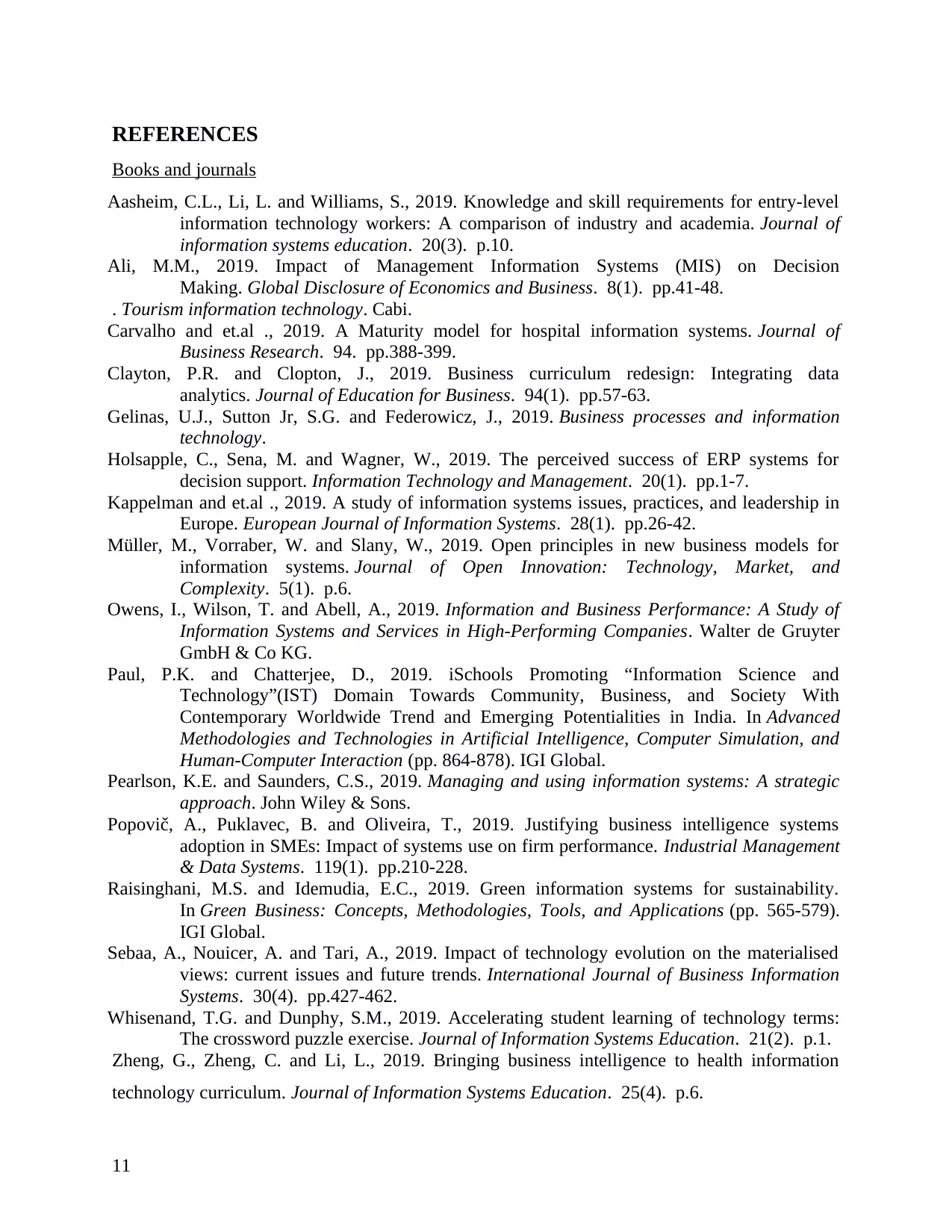
REFERENCES
Books and journals
Aasheim, C.L., Li, L. and Williams, S., 2019. Knowledge and skill requirements for entry-level
information technology workers: A comparison of industry and academia. Journal of
information systems education. 20(3). p.10.
Ali, M.M., 2019. Impact of Management Information Systems (MIS) on Decision
Making. Global Disclosure of Economics and Business. 8(1). pp.41-48.
. Tourism information technology. Cabi.
Carvalho and et.al ., 2019. A Maturity model for hospital information systems. Journal of
Business Research. 94. pp.388-399.
Clayton, P.R. and Clopton, J., 2019. Business curriculum redesign: Integrating data
analytics. Journal of Education for Business. 94(1). pp.57-63.
Gelinas, U.J., Sutton Jr, S.G. and Federowicz, J., 2019. Business processes and information
technology.
Holsapple, C., Sena, M. and Wagner, W., 2019. The perceived success of ERP systems for
decision support. Information Technology and Management. 20(1). pp.1-7.
Kappelman and et.al ., 2019. A study of information systems issues, practices, and leadership in
Europe. European Journal of Information Systems. 28(1). pp.26-42.
Müller, M., Vorraber, W. and Slany, W., 2019. Open principles in new business models for
information systems. Journal of Open Innovation: Technology, Market, and
Complexity. 5(1). p.6.
Owens, I., Wilson, T. and Abell, A., 2019. Information and Business Performance: A Study of
Information Systems and Services in High-Performing Companies. Walter de Gruyter
GmbH & Co KG.
Paul, P.K. and Chatterjee, D., 2019. iSchools Promoting “Information Science and
Technology”(IST) Domain Towards Community, Business, and Society With
Contemporary Worldwide Trend and Emerging Potentialities in India. In Advanced
Methodologies and Technologies in Artificial Intelligence, Computer Simulation, and
Human-Computer Interaction (pp. 864-878). IGI Global.
Pearlson, K.E. and Saunders, C.S., 2019. Managing and using information systems: A strategic
approach. John Wiley & Sons.
Popovič, A., Puklavec, B. and Oliveira, T., 2019. Justifying business intelligence systems
adoption in SMEs: Impact of systems use on firm performance. Industrial Management
& Data Systems. 119(1). pp.210-228.
Raisinghani, M.S. and Idemudia, E.C., 2019. Green information systems for sustainability.
In Green Business: Concepts, Methodologies, Tools, and Applications (pp. 565-579).
IGI Global.
Sebaa, A., Nouicer, A. and Tari, A., 2019. Impact of technology evolution on the materialised
views: current issues and future trends. International Journal of Business Information
Systems. 30(4). pp.427-462.
Whisenand, T.G. and Dunphy, S.M., 2019. Accelerating student learning of technology terms:
The crossword puzzle exercise. Journal of Information Systems Education. 21(2). p.1.
Zheng, G., Zheng, C. and Li, L., 2019. Bringing business intelligence to health information
technology curriculum. Journal of Information Systems Education. 25(4). p.6.
11
Books and journals
Aasheim, C.L., Li, L. and Williams, S., 2019. Knowledge and skill requirements for entry-level
information technology workers: A comparison of industry and academia. Journal of
information systems education. 20(3). p.10.
Ali, M.M., 2019. Impact of Management Information Systems (MIS) on Decision
Making. Global Disclosure of Economics and Business. 8(1). pp.41-48.
. Tourism information technology. Cabi.
Carvalho and et.al ., 2019. A Maturity model for hospital information systems. Journal of
Business Research. 94. pp.388-399.
Clayton, P.R. and Clopton, J., 2019. Business curriculum redesign: Integrating data
analytics. Journal of Education for Business. 94(1). pp.57-63.
Gelinas, U.J., Sutton Jr, S.G. and Federowicz, J., 2019. Business processes and information
technology.
Holsapple, C., Sena, M. and Wagner, W., 2019. The perceived success of ERP systems for
decision support. Information Technology and Management. 20(1). pp.1-7.
Kappelman and et.al ., 2019. A study of information systems issues, practices, and leadership in
Europe. European Journal of Information Systems. 28(1). pp.26-42.
Müller, M., Vorraber, W. and Slany, W., 2019. Open principles in new business models for
information systems. Journal of Open Innovation: Technology, Market, and
Complexity. 5(1). p.6.
Owens, I., Wilson, T. and Abell, A., 2019. Information and Business Performance: A Study of
Information Systems and Services in High-Performing Companies. Walter de Gruyter
GmbH & Co KG.
Paul, P.K. and Chatterjee, D., 2019. iSchools Promoting “Information Science and
Technology”(IST) Domain Towards Community, Business, and Society With
Contemporary Worldwide Trend and Emerging Potentialities in India. In Advanced
Methodologies and Technologies in Artificial Intelligence, Computer Simulation, and
Human-Computer Interaction (pp. 864-878). IGI Global.
Pearlson, K.E. and Saunders, C.S., 2019. Managing and using information systems: A strategic
approach. John Wiley & Sons.
Popovič, A., Puklavec, B. and Oliveira, T., 2019. Justifying business intelligence systems
adoption in SMEs: Impact of systems use on firm performance. Industrial Management
& Data Systems. 119(1). pp.210-228.
Raisinghani, M.S. and Idemudia, E.C., 2019. Green information systems for sustainability.
In Green Business: Concepts, Methodologies, Tools, and Applications (pp. 565-579).
IGI Global.
Sebaa, A., Nouicer, A. and Tari, A., 2019. Impact of technology evolution on the materialised
views: current issues and future trends. International Journal of Business Information
Systems. 30(4). pp.427-462.
Whisenand, T.G. and Dunphy, S.M., 2019. Accelerating student learning of technology terms:
The crossword puzzle exercise. Journal of Information Systems Education. 21(2). p.1.
Zheng, G., Zheng, C. and Li, L., 2019. Bringing business intelligence to health information
technology curriculum. Journal of Information Systems Education. 25(4). p.6.
11
1 out of 11
Related Documents
Your All-in-One AI-Powered Toolkit for Academic Success.
+13062052269
info@desklib.com
Available 24*7 on WhatsApp / Email
![[object Object]](/_next/static/media/star-bottom.7253800d.svg)
Unlock your academic potential
Copyright © 2020–2026 A2Z Services. All Rights Reserved. Developed and managed by ZUCOL.





